


Artificial intelligence (AI) is revolutionizing cybersecurity, offering unprecedented capabilities to tackle previously unmanageable threats, an industry insider said on the sidelines of the 2024 World Internet Conference Wuzhen Summit.
Qi Xiangdong, chairman of Chinese cybersecurity company Qi-Anxin, highlighted the transformative impact of AI-driven technology on the industry. A single AI-powered robot now performs the equivalent work of 60 top-tier cybersecurity analysts, allowing teams to address complex security incidents with far greater efficiency, according to Qi. This advance represents a significant leap in global efforts to ensure digital security, he added.
China's tremendous progress in internet technology and cybersecurity has drawn attention worldwide, with global participants at the conference emphasizing the importance of collaboration and shared innovation to tackle emerging challenges in the digital age, Qi noted.
Zhao Houlin, former secretary-general of International Telecommunication Union, was honored with the World Internet Conference Distinguished Contribution Award at the 2024 WIC Wuzhen Summit for his dedication to the innovation and inclusive development of the information and communication industry.
Looking back on the past decade of China's internet industry, he noted its transformation from focusing on the domestic market to engaging global consumers. He highlighted that many people in developing countries have reaped significant benefits from China's internet advancements, and stressed the crucial role of the younger generation in continuing China's internet development.
Zhao Zhongxiu, president of the University of International Business and Economics (UIBE), has highlighted China's pioneering role in the development of the cross-border e-commerce sector, as well as the university's commitment to fostering talent and international cooperation to support the industry's ongoing development.
Speaking on the sidelines of the 2024 World Internet Conference Wuzhen Summit, Zhao emphasized the importance of talent cultivation in this endeavor. The UIBE has spearheaded the establishment of the Global Cross-Border E-Commerce Education Innovation Alliance, aiming to facilitate cooperation through education, according to Zhao. This move indicates China's proactive approach to shaping the future of global e-commerce through education and international cooperation, he added.
Zheng Min, chairman of Ebrun, a Chinese e-commerce consulting firm, and dean of the Ebrun Think Tank, said that China's cross-border e-commerce has been flourishing in the past decade, and will grow with higher quality and sustainability in the future.
Emphasizing the active role of the World Internet Conference (WIC) in enhancing international cooperation in e-commerce, he noted that bilateral and multilateral exchanges in cross-border e-commerce will further accelerate the development of the WIC.

This year marks the 30th anniversary of China's full access to the global internet and the beginning of the "next decade" for the World Internet Conference Wuzhen Summit.
As one of the featured events held in Wuzhen, Zhejiang province, the permanent venue for the summit, the 2024 Yangtze River Delta Digital Development Conference took place on Nov 21.
In his speech at the conference, Hu Wei, vice-governor of Zhejiang province, said: "As an important participant and active promoter of Yangtze River Delta integration, Zhejiang has always been committed to leveraging digitalization to enhance the region's high-quality integration...Together, we aim to energize the digital economy, improve digital governance, optimize the digital social environment, and strengthen digital security."
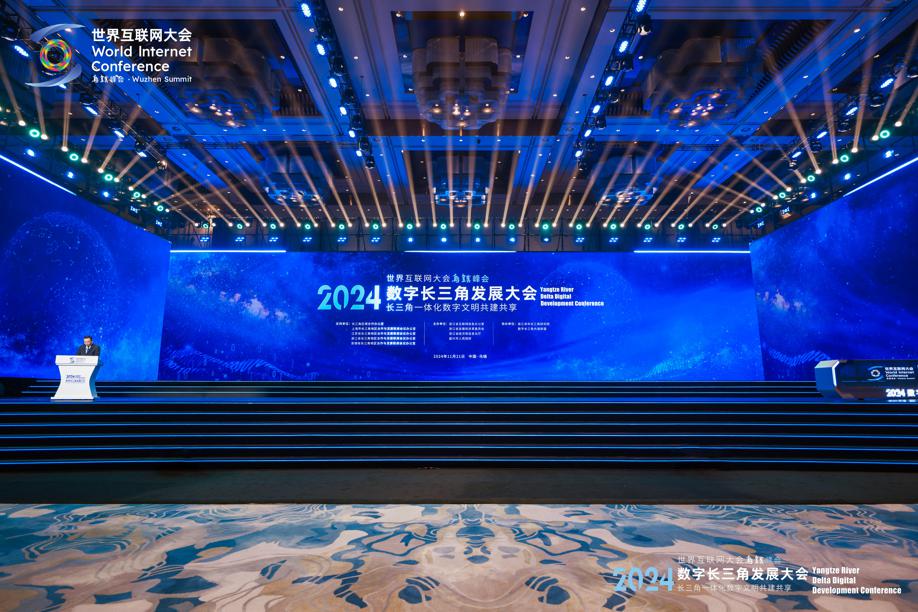
During the event, the Digital Yangtze River Delta Development Report (2024) and innovations in AI-driven applications were unveiled. Supporting activities included a digital technology exhibition and interactive showcases, highlighting the region's innovation and cooperation in the digital economy.
The report revealed that in 2023, the value of the Yangtze River Delta's digital economy exceeded 12 trillion yuan, representing over 40 percent of the regional GDP and about 30 percent of the national digital economy. The conference also focused on areas such as computing infrastructure, artificial intelligence, smart vehicles, low-altitude economies, and digital rural initiatives. Five industry research tracks were launched, alongside interactive displays of cutting-edge digital products such as AI large-scale models, humanoid robots, smart health diagnostics, and audiovisual walls, providing attendees with an immersive experience of the latest advancements in digital technology.
Qiao Shan, a famous actor and comedian, served as the host for the Internet Public Welfare and Charity Forum at the 2024 WIC Wuzhen Summit. During the event, he shared a message with young internet users, emphasizing the importance of spreading positivity, joy and uplifting energy through both online platforms and his work.
John Hoffman, CEO of the Global System for Mobile Communications Association (GSMA), has been awarded the World Internet Conference Distinguished Contribution Award for his outstanding contributions to the global internet sector.
While AI is already a familiar concept worldwide, the discussion around the ethical use of AI is relatively recent. Hoffman emphasized that this year's WIC Wuzhen Summit is perfectly timed and located, focusing on the right topic. The summit provides an excellent platform for industry leaders from diverse backgrounds to exchange insights on how to harness AI for the greater good of humanity, he said.
When we're young, finding our true career passion can be a struggle. How do you figure out what to dedicate your life to?
At the 2024 World Internet Conference (WIC) Wuzhen Summit, China Daily reporter Yan An asked two WIC Global Youth Leaders this very question—and their answers were surprisingly similar.
These young leaders are not only shaping the future of internet development and governance, but their passion is also driving personal transformation and making a meaningful impact on the world.
The 2024 World Internet Conference (WIC) Cross-Border E-Commerce Sustainable Development Forum was held in Wuzhen, East China’s Zhejiang province, on Nov 21. Three research reports on cross-border e-commerce competitiveness were released at the forum.
The WIC has partnered with its members and the WIC Working Group on Cross-Border E-Commerce, along with industry think tanks, academic institutions and enterprises, to conduct research on cross-border e-commerce competitiveness.
The three reports, as the outcomes of these joint efforts, focus on countries, platform enterprises and logistics companies, respectively.
The Cross-Border E-Commerce Competitiveness Research Report – Country-Level Analysis evaluated 55 countries across six continents, using an indicator system to measure competitiveness based on two dimensions: business environment and industry competitiveness.
The Cross-Border E-Commerce Competitiveness Research Report – Platform Enterprises analyzed 50 leading global platform enterprises across four dimensions: operational capacity, service capacity, sustainability and innovation.
The Cross-Border E-Commerce Competitiveness Research Report – Logistics Enterprises examined 50 global leaders, focusing on transport, warehousing and end-to-end service capabilities.
Cross-border e-commerce is a priority area for the WIC. In June 2023, the WIC established the Working Group on Cross-Border E-Commerce.
The Working Group released the Report on Developments of International Normative Systems on Cross-Border E-Commerce during last year’s WIC Wuzhen Summit and the World Internet Conference Collection of Cross-Border E-Commerce Practice Cases (2024) at the Digital Silk Road Development Forum in April.
The 2024 World Internet Conference (WIC) Data Governance Forum took place in Wuzhen, East China's Zhejiang province, on Nov 21, during which the report, Promoting Open, Collaborative, and Mutually Beneficial Global Data Cooperation, was released.
Data is a key production factor and fundamental strategic resource in the digital economy, and holds immense economic and social value. Building international consensus and unlocking the value of data resources are of great significance in bridging development gaps and promoting inclusive and sustainable global development.
Leveraging the expertise of its Data Working Group, the WIC conducted extensive research among member enterprises and sought feedback from all working group members and industry experts. These efforts culminated in this report.
The report begins by addressing the significance and value of international data cooperation and its essential ecosystem components.
It identifies multiple challenges in areas such as policies, regulations, and technical standards, and proposes four consensus principles and four actionable initiatives to promote and advance international data cooperation.
Young people are key drivers of innovation and change. The Youth and Digital Future Forum of the 2024 WIC Wuzhen Summit opened on Thursday, with 18 youth leaders from 17 countries and regions sharing their insights.
The forum, hosted by the WIC and co-organized by Renmin University of China and the Confederation of Young Leaders of India, was themed "Passion, Connection, Action". It aims to pool insights from young people to explore the boundless possibilities of the digital future. The event also saw the release of the "World Internet Conference Global Youth Leaders Initiative".
It's time for young people to take action.
At the Youth and Digital Future Forum during the 2024 World Internet Conference Wuzhen Summit on Nov 21, youth leaders unveiled the "World Internet Conference Global Youth Leaders Initiative".
The initiative calls on young people worldwide to take responsibility and work together to create a cyberspace that is universally beneficial, prosperous, peaceful, secure, equal and inclusive.
The initiative offers four for young people: actively participate in developing and implementing fair and reasonable digital polices; promote cutting-edge technologies for the benefit of all; engage in digital technology and industry innovation practices; and contribute to the building of an inclusive and shared digital society.
The Global Youth Leadership Program award ceremony took place at the main forum of the 2024 World Internet Conference Wuzhen Summit on Nov 20, where 18 outstanding young leaders from 17 countries and regions were honored with certificates.
Drawing from their diverse cultural backgrounds and expertise, these individuals are committed to fostering innovation and ensuring that more people benefit from the digital revolution.
Watch the video to witness this inspiring ceremony.

With a focus on emerging digital opportunities around the world, the latest internet development reports highlight China's global leadership in the digital industry, with the country showing rapid growth and expanding international influence in the digital culture sector.
According to the World Internet Development Report released on Thursday at the ongoing 2024 World Internet Conference Wuzhen Summit in Wuzhen, Zhejiang province, China ranks second among the 52 involved economies worldwide in internet development, with a score of 69 — just behind the United States.
This year marks the 30th anniversary of China's fully functional access to the global internet, during which time the country has witnessed a steadily improved cyber ecosystem, rapidly advanced core technologies, comprehensively enhanced cybersecurity capabilities, deepened legal governance and expanded international cooperation, said Wang Jiang, head of the Chinese Academy of Cyberspace Studies, the reports' publisher.
Based on six indicators — information infrastructure, digital technology and innovation capability, digital economy, digital government, cybersecurity and international governance in cyberspace, it said the global digital economy is experiencing a new wave of growth, with more development potential rapidly unfolding.
With a specific focus on China's performance in terms of digital development, another report by the academy highlighted the impressive performance of the country's digital culture industry in recent years.
According to the China Internet Development Report 2024, the country's online audiovisual market — including long videos, short videos, livestreaming and audio sectors — had reached a market size of 1.15 trillion yuan ($159 billion) by end-2023. Meanwhile, the domestic gaming industry's actual sales revenue stood at about 303 billion yuan during the same period.
"In recent years, China's digital culture has flourished, producing high-quality works across fields such as mini-dramas, online literature, video games and digital animation," Wang said.
The country's digital culture vitality is not merely limited to its domestic market. According to the report, China's online literature sector has also seen remarkable success overseas, with export sales of over 4 billion yuan, attracting 230 million overseas readers last year. Additionally, domestically developed games generated overseas sales of $16.37 billion in 2023, marking the fourth consecutive year of surpassing the 100 billion-yuan threshold, it said.
"Our digital cultural products are now more diverse and globally accessible. A large number of high-quality creations have transcended cultural boundaries and gained recognition from audiences worldwide," said Qian Xianliang, deputy director of the Chinese Academy of Cyberspace Studies.
For instance, the Chinese mythology-inspired video game Black Myth: Wukong has captivated domestic and international audiences, driving widespread discussions and sales of over $1 billion on online gaming platform Steam by October, Qian added.
In addition, Chinese science fiction television series Three-Body has spearheaded Chinese cultural productions' globalization, reaching audiences in over 190 countries and regions, he said, adding that many Chinese online literature works have also been translated into English, French, Spanish, Arabic and many other languages, further extending their global reach.
"The digital culture industry, represented by video games, short videos and livestreaming, has now become a cornerstone of China's cultural sector. It plays a pioneering role in driving the deep integration of culture and technology, embedding China's rich traditional culture into the fabric of modern civilization through digitalization," said Sun Jiashan, associate researcher at the Central Academy of Culture and Tourism Administration.
Sun also emphasized the key role of emerging technologies such as artificial intelligence and large language models in driving digital culture growth.
"Cutting-edge technologies are reshaping the international dissemination of Chinese culture. For example, AI-powered translation has significantly reduced the cost of translating Chinese online literature into multiple languages, enabling broader global accessibility in a way more efficient than ever," Sun said.
"The achievements in digital technology and infrastructure are not only fueling localized production and dissemination of cultural works, but also promoting the values of cultural diversity and fostering dialogue and mutual respect among different cultures on a global scale," he added.
Contact the writers at [email protected]
Experts, officials and representatives from internet enterprises shared their insights on the development of technology at the main forum of the 2024 World Internet Conference Wuzhen Summit. The summit, held in Wuzhen, east China's Zhejiang province, runs until Friday. Here are some highlights from the speeches.
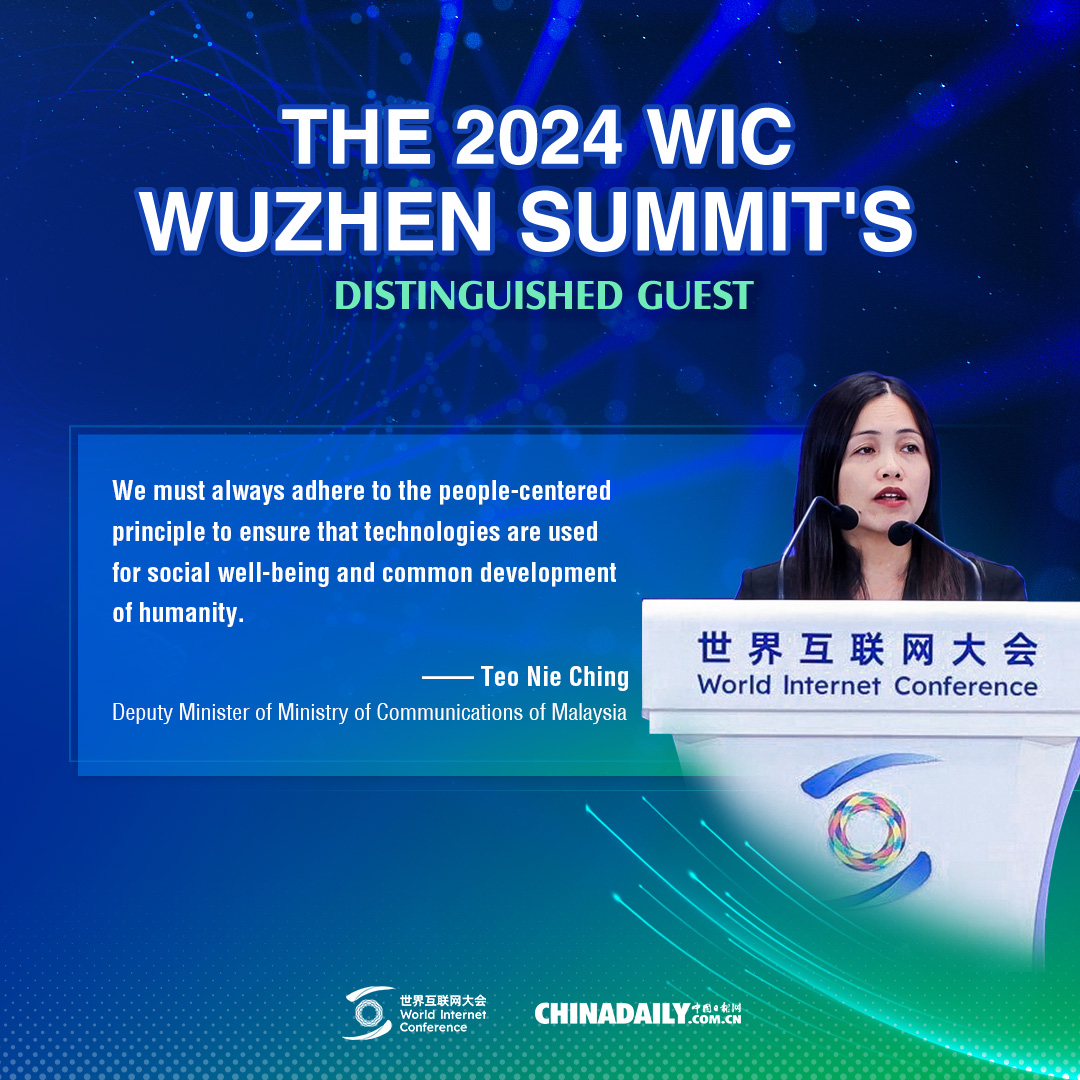
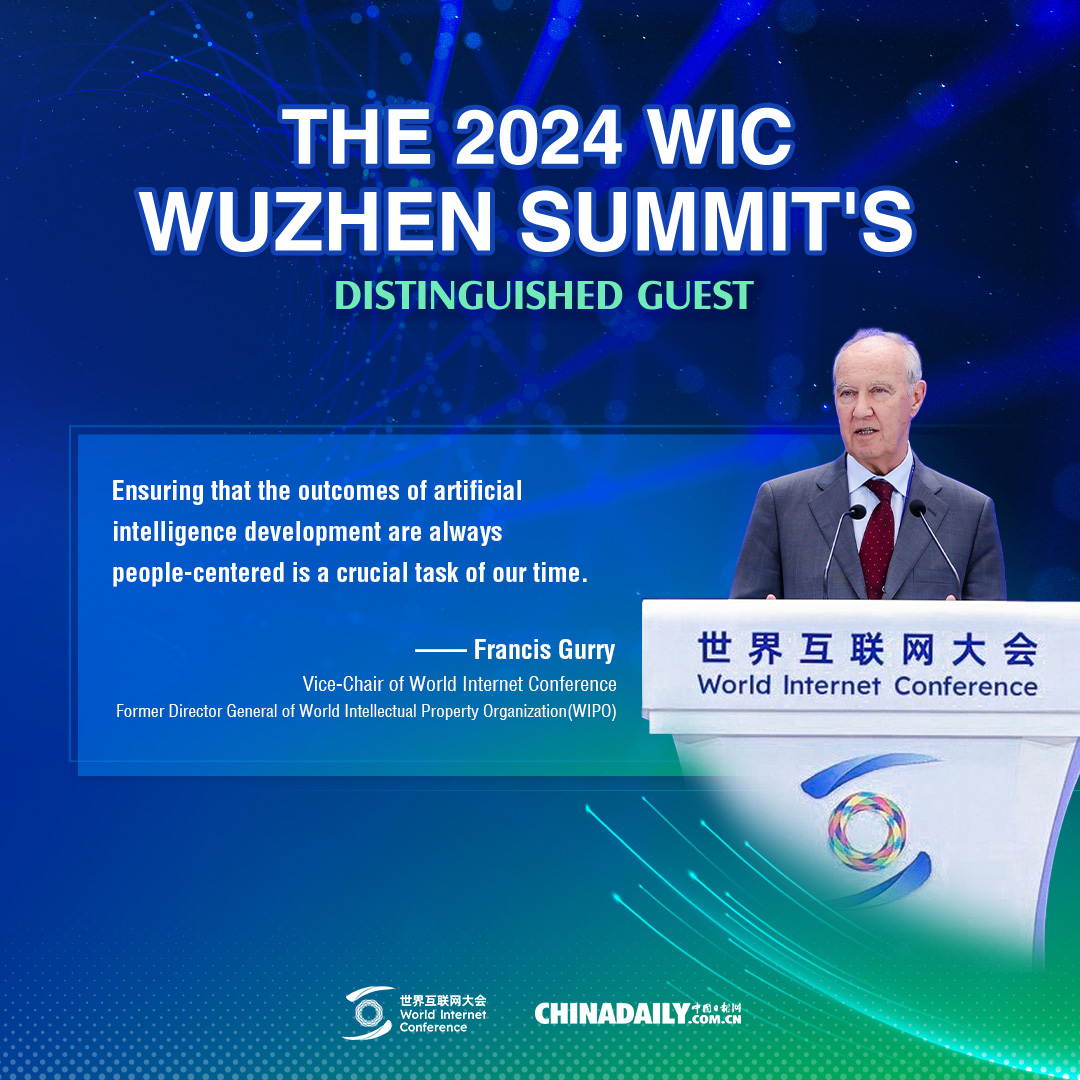
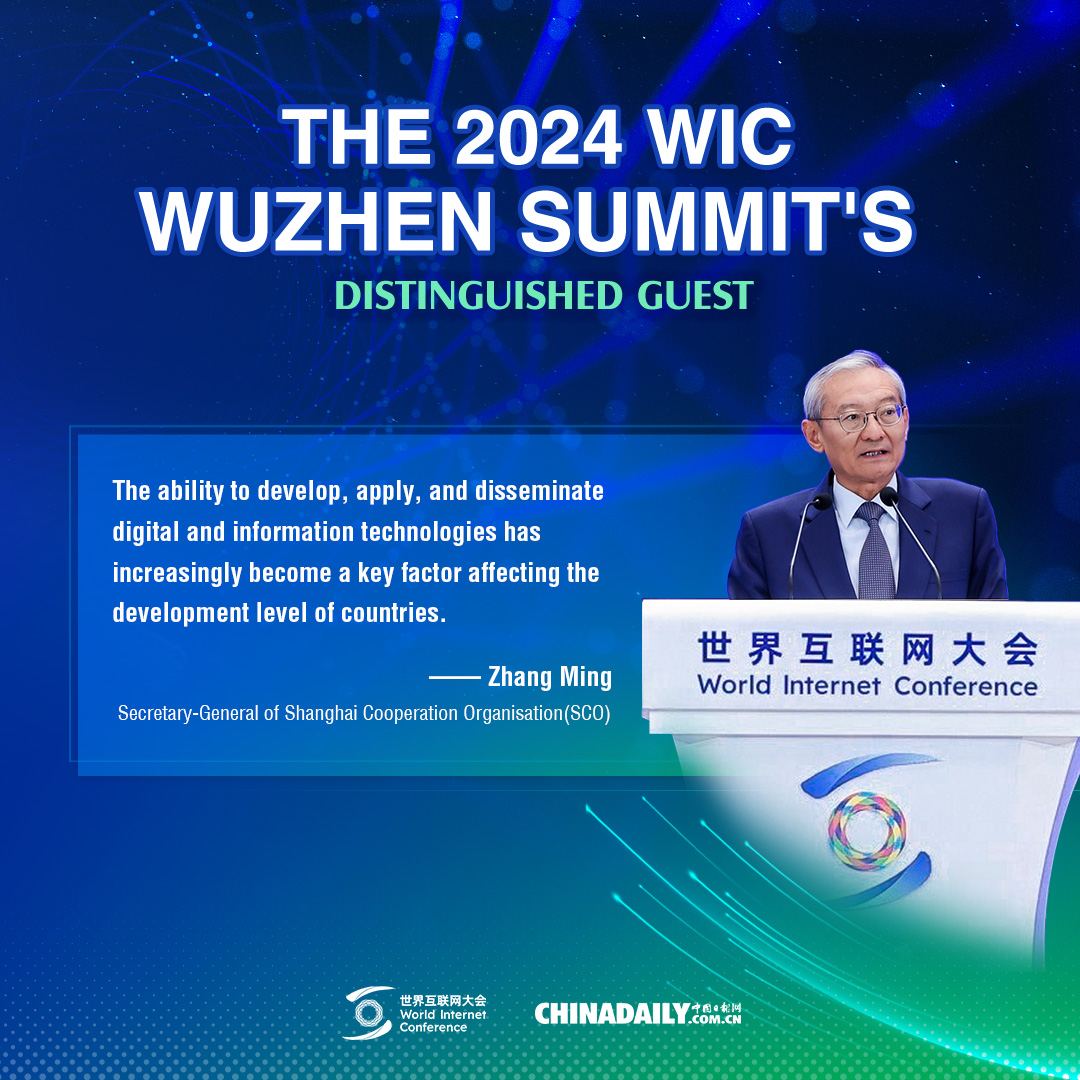

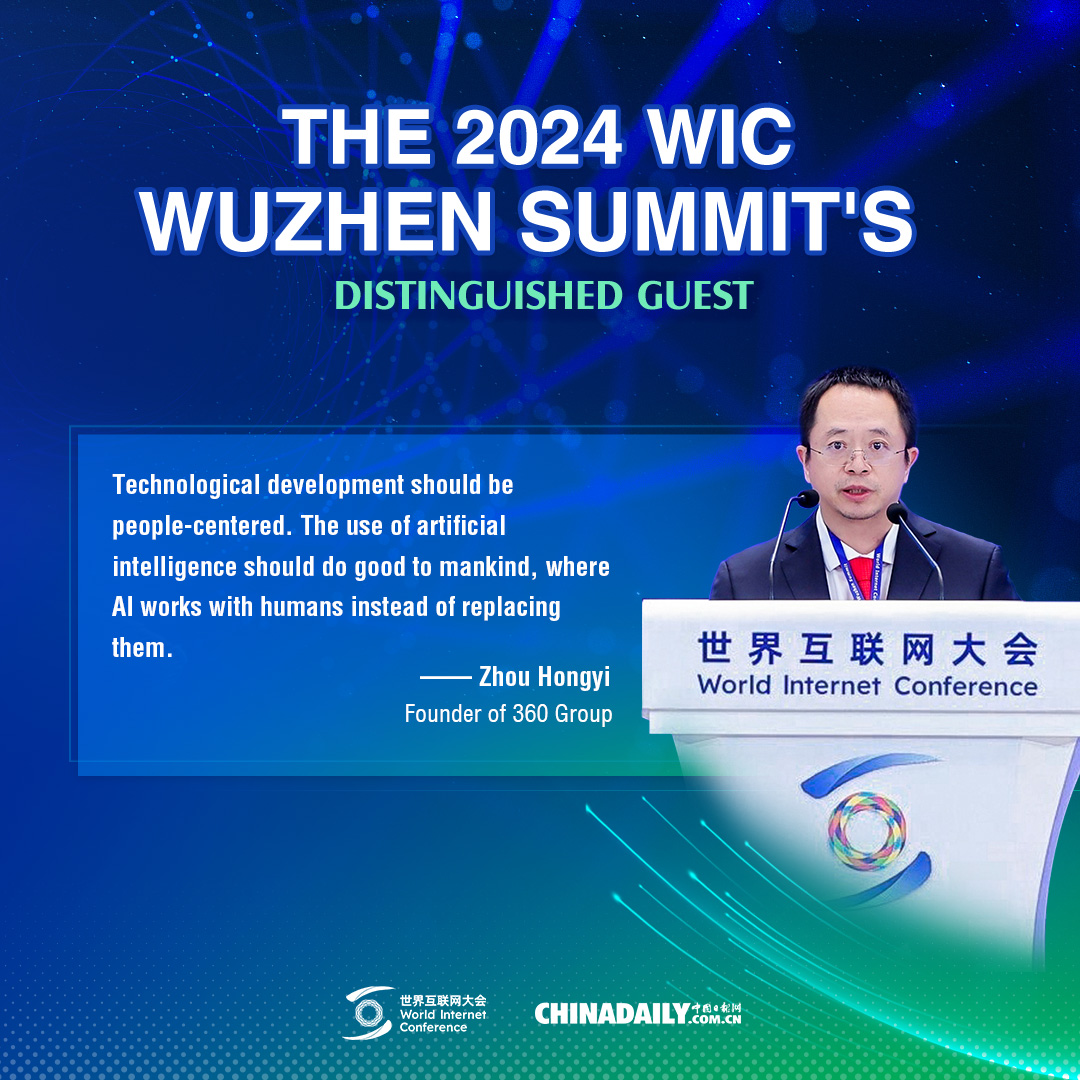
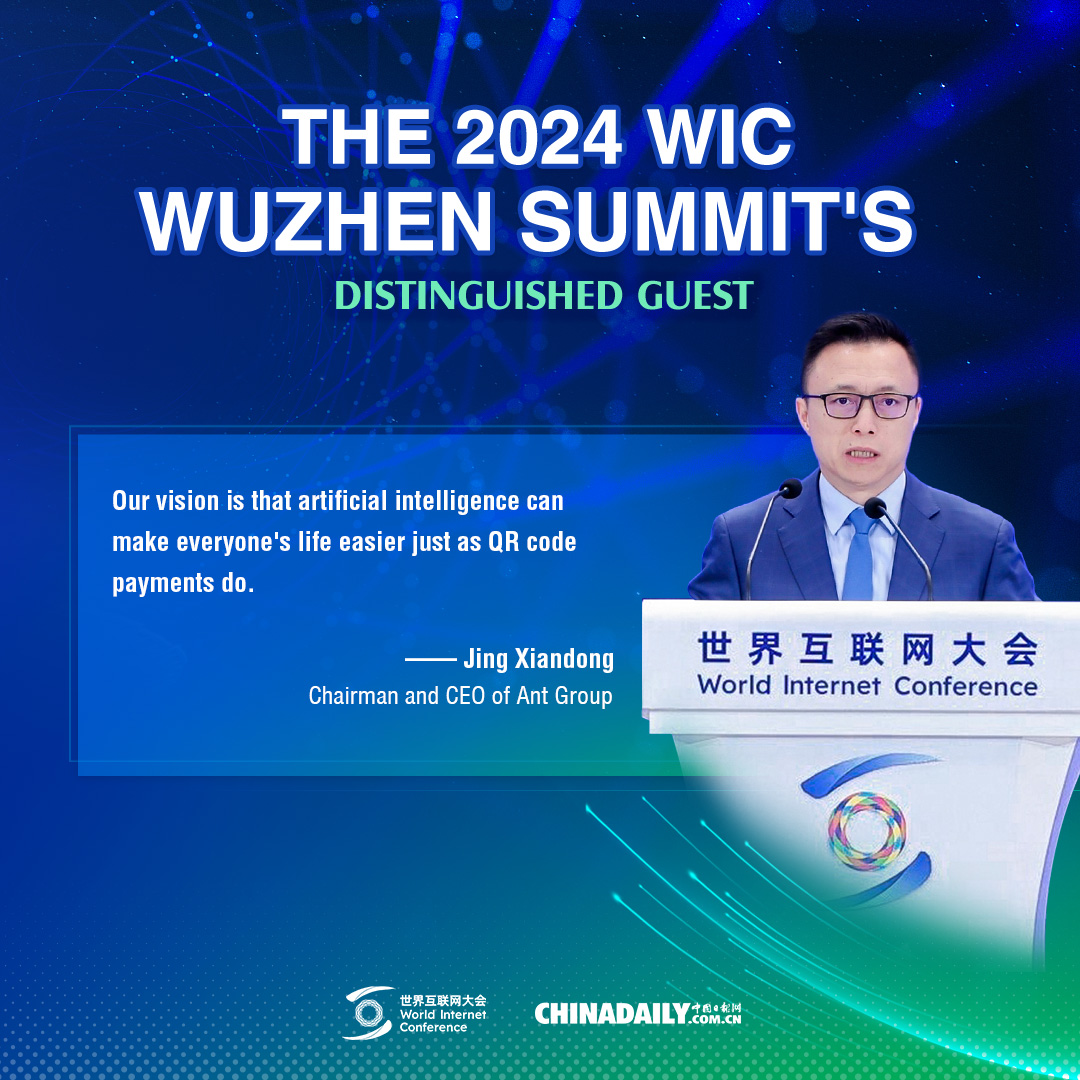
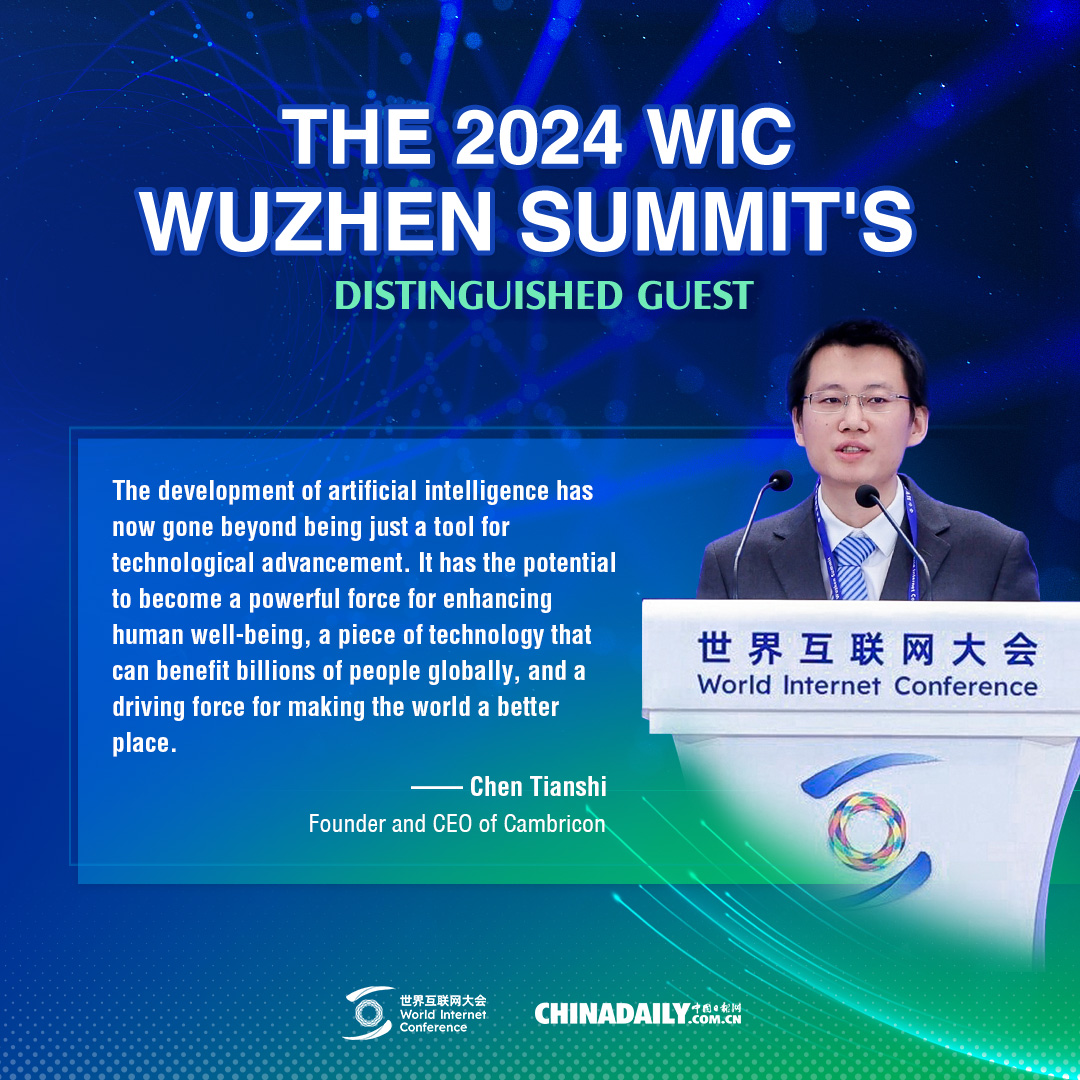
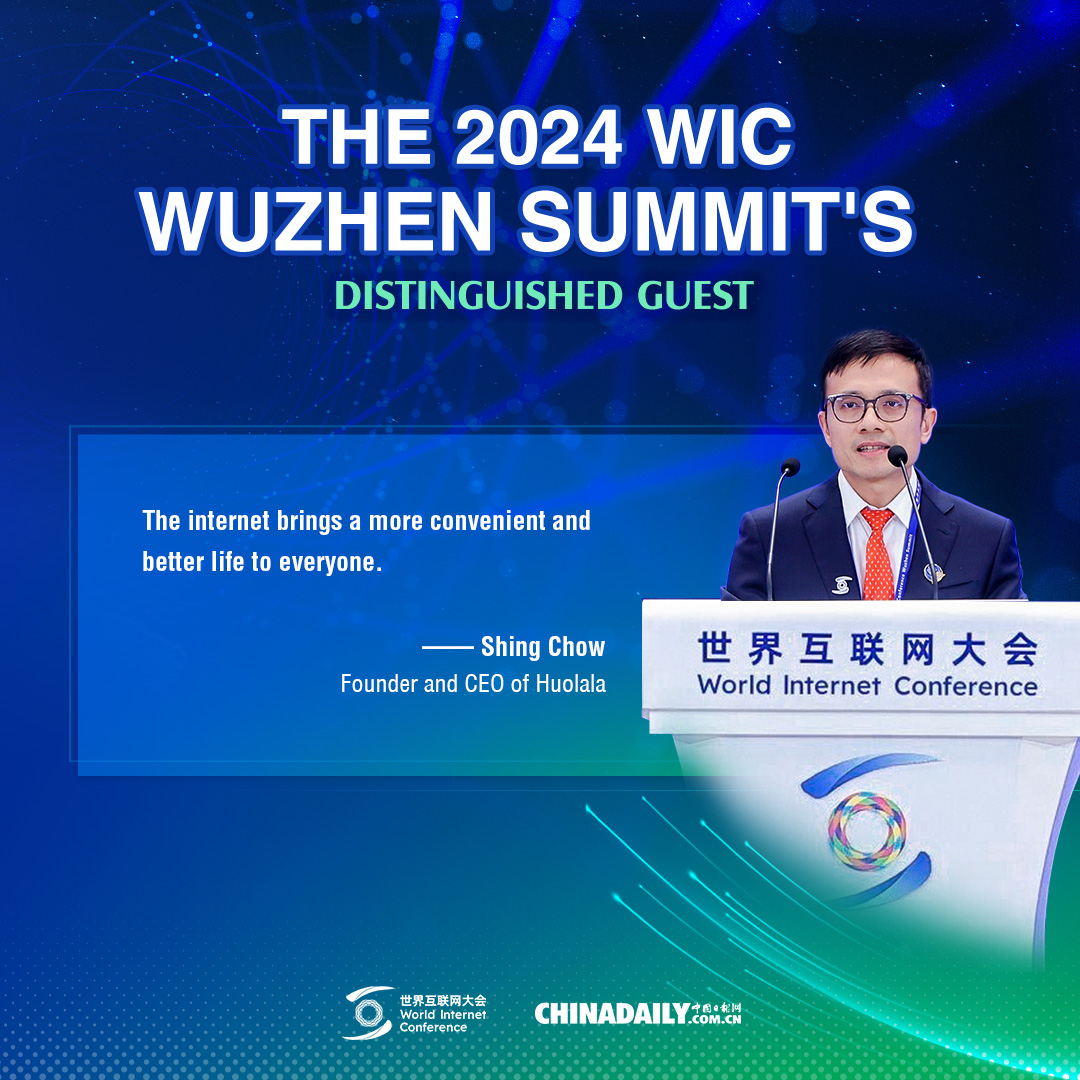
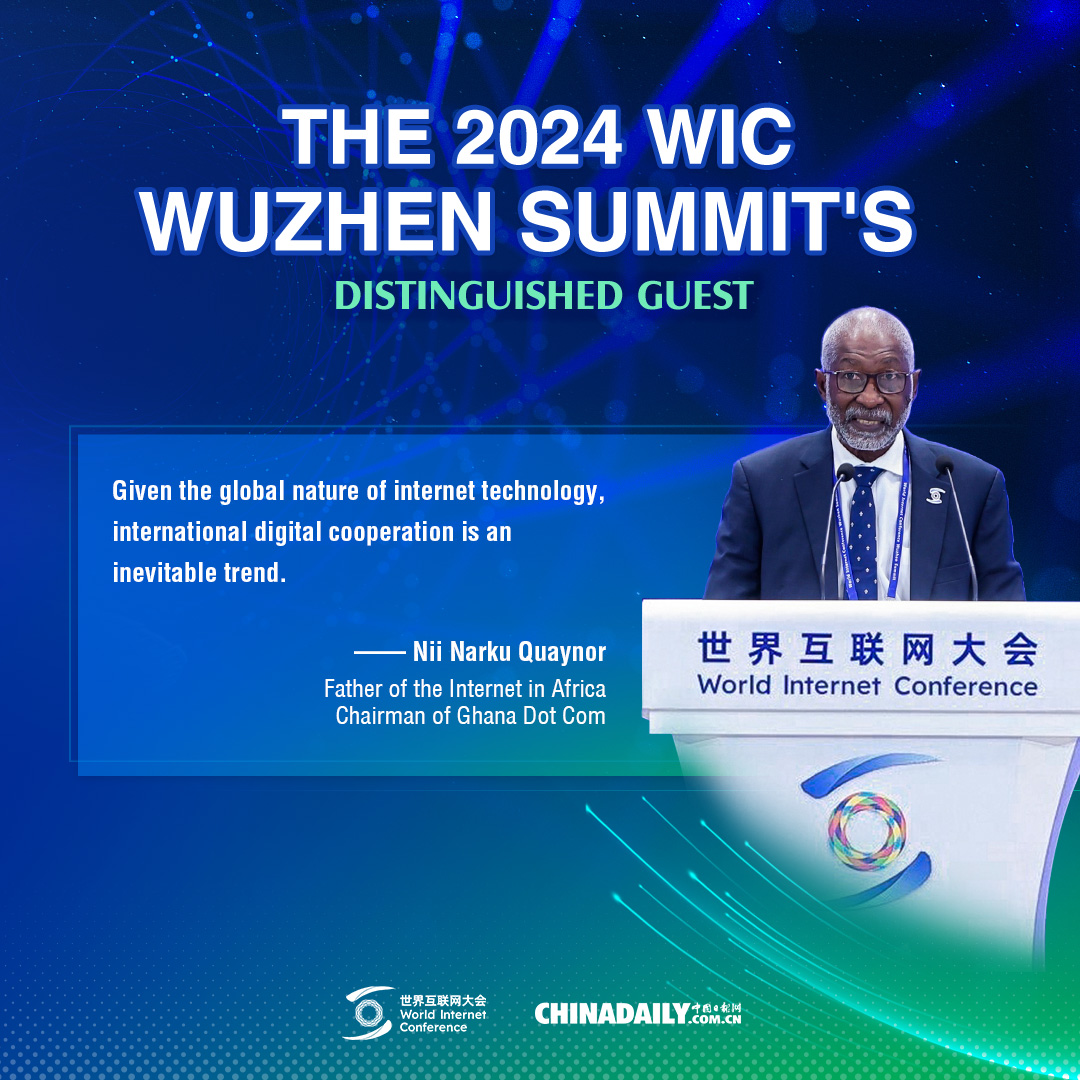

The opening ceremony of the 2024 World Internet Conference Wuzhen Summit was held in Wuzhen, Zhejiang province, on Nov 20.
Visitors attended the opening ceremony with enthusiasm, and those who made great contributions to certain technological fields were honored at the World Internet Conference Distinguished Contribution Award ceremony.
The Light of Internet Expo opened on Nov 19 with the exhibition focusing on artificial intelligence. People can not only interact with the latest AI products but also find industrial cooperation opportunities at the expo.
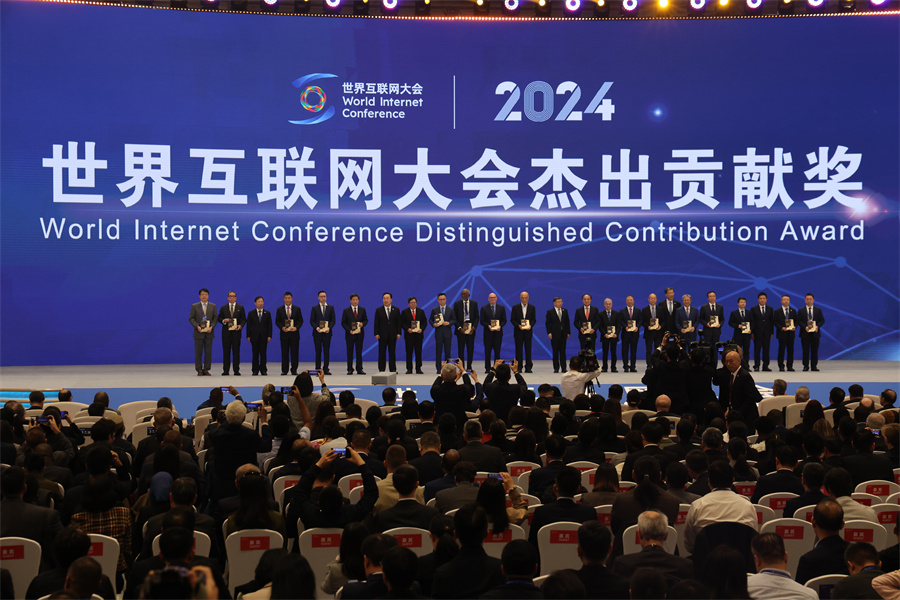
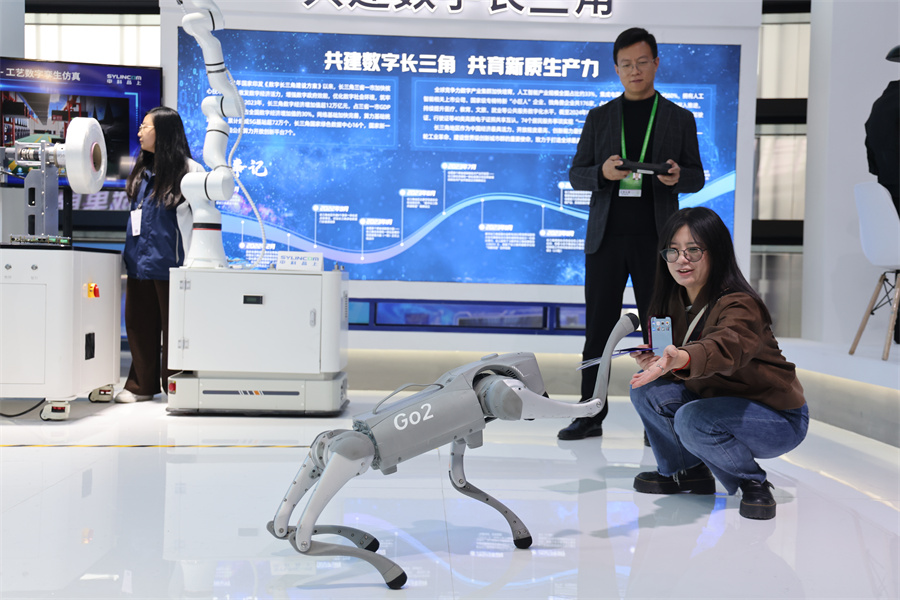



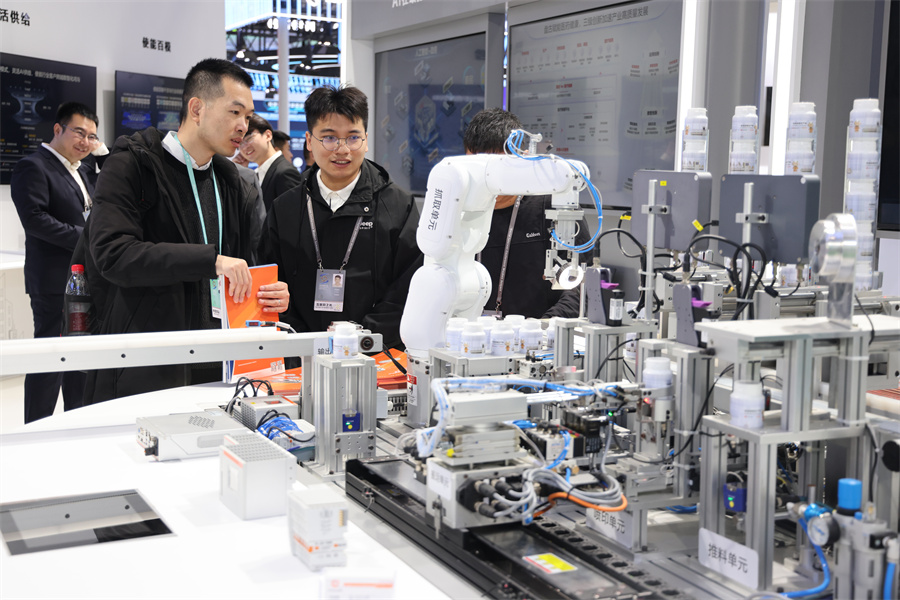

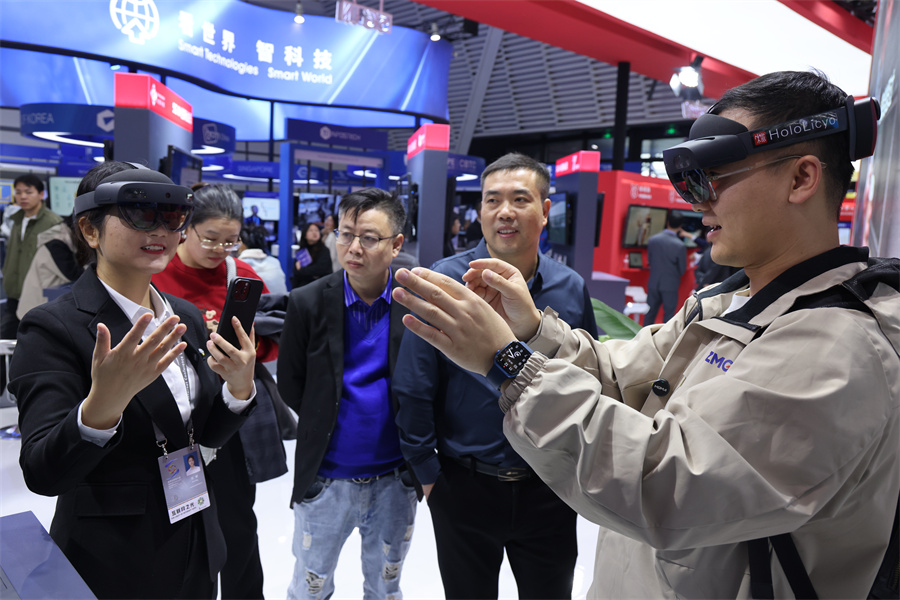
Nii Narku Quaynor, a Ghanaian scientist and engineer who is known as the "father of the internet in Africa", is among seven exceptional individuals honored with the World Internet Conference (WIC) Distinguished Contribution Award.
A pioneer in advancing Africa's internet connectivity, Quaynor views this recognition as a catalyst for inspiring youth in the Global South to contribute to the internet's growth. While Africa faces challenges like technical capacity and operational limitations, these hurdles also present opportunities for global collaboration to foster a more inclusive and connected digital future, according to Quaynor.
Wu Hequan, a winner of the 2024 World Internet Conference Distinguished Contribution Award, has pioneered the development of telecommunication devices and systems, and made significant contributions to the development of next-generation internet and the large-scale deployment of IPv6, charting the technological future of the information age.
Watch the video for more!

Eyeing in-depth integration of vehicle-road-cloud systems for smart cars, China Unicom has unveiled an integrated solution 3.0 for intelligent connected vehicles.
The intelligent solution was released at the "Integrated Development of Vehicle-Road-Cloud "forum, a side event at the 2024 China 5G+ Industrial Internet Conference in Wuhan, Hubei province, on Wednesday.
"The latest solution integrates roadside sensing, edge computing, cloud-based data fusion, and other cutting-edge communication technologies, and can enable efficient collaboration among vehicles, infrastructure and cloud systems," said Zhou Guangtao, director of the intelligent connection research institute of China Unicom Smart Connection Technology.
By establishing a multitiered computing system, a unified security platform, a digital twin system and a comprehensive testing and certification framework, it leverages China Unicom's core strengths in the internet of vehicles (IoV) sector and aims to accelerate the industrialization of the vehicle-road-cloud integration for ICVs, Zhou added.
Vehicle-road-cloud integration, an autonomous driving solution led by China, will not only propel the country's ICV industry, but also drive the development of smart cities, traffic management and overall industrial upgrades, said Zhao Xiaoyu, general manager of the smart transportation division at the company.
To date, over 70 percent of connected vehicles in China use network services provided by China Unicom, covering 92 automakers. This has given the major telecom operator an edge in emerging as a key player in advancing such integration, Zhao added.
Vehicle-road-cloud integration is believed to be a key pathway to driving the large-scale industrial application of intelligent connected vehicles.
In July, the Ministry of Industry and Information Technology, along with four other departments, announced the first batch of pilot cities for vehicle-road-cloud integration applications. Hubei's Wuhan and Shiyan were among the selected cities.
"The inclusion of the two cities in the list signifies a new phase in the transformation and upgrading of Hubei's automotive industry," said Ai Jinqun, an official from Hubei's bureau of economy and information technology.
"Wuhan, for example, now serves as a global leader in autonomous driving services, bringing together a large number of core enterprises in the ICV industry chain," Ai added.
As China is ramping up efforts for the large-scale application of smart connection technologies, MIIT also launched its first batch of 10 pilot cities for the "5G+ industrial internet" integrated application during the conference on Tuesday. The cities include Wuhan; Nanjing in Jiangsu province; and Qingdao in Shandong province.
The winners of the newly established World Internet Conference (WIC) Distinguished Contribution Award have been announced at the opening ceremony of the 2024 WIC Wuzhen Summit.
The award honors individuals and enterprises for their exceptional contributions to the global internet sector. Seven individuals and 14 enterprises were recognized on Wednesday for their remarkable achievements in driving innovation and shaping the digital future.
Click the video to find out more!
